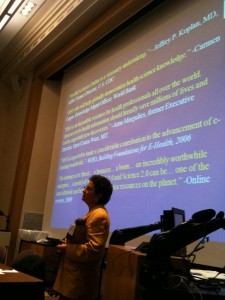Here is a follow-up By Dr. Jessica Evert, CFHI Medical Director, from the CUGH Conference, see earlier posts from Sept 20th and Sept 21st.
I am excited about the open access movement, in publishing, medical education, and in global health. The prospect of Open Educational Resources (OER) in addressing workforce issues and the education drought in many low resource countries is quite promising. Tufts and University of Michigan presented there work in this area at  the recent CUGH meeting in Seattle, Washington. Erica Frank, who recently moved from Emory to UBC, also presented on her Health Sciences Online project which provides over 50,000 educational resources in over 40 languages (it is powered by Google Translator), that are not only free, but ad-free. Perhaps the most inspiring presentation was by Richard Adanu, from University of Ghana, who presented on OERAfrica. His step-by-step instruction for a cesarean section can be found at this link. He commented on a unique issue at teaching hospitals in Ghana, and many places in Africa. Unlike in the US where there are one or two students in each surgical procedure trying to learn, in Ghana there may be ten or even more. Thus, it is almost impossible for the students to see the procedure. These videos help immensely so students can actually see the procedure. One of my concerns about exporting US medical school curriculum to Africa or other places is that it might not be applicable. I asked Dr. Adanu about this issue. He said that while there may be certain things that are different (the brand of medication available, or specific cultural acceptance of interventions), generally these online resources are viewed before class by students, and then serve as the focal point of a conversation in the classroom setting, where instructors can discuss the local variations and context. Interestingly, Tufts is using their open source software called TUSK to allow medical schools abroad to customize curriculum and utilize smart phone technology to tele-consult and have other collaborative discussions. One faculty member in the audiences commented that in ten years this may put teaching faculty out of business. A panelist replied that it will require that teaches become facilitators of discussions and critical thinking, rather than merely deliverers of information. Half joking, but maybe actually not, moderator David Stern commented, “in the future we may get promoted based on the number of hits we get.” This is a real possibility- any maybe hits from sub-Saharan Africa and low resource countries should carry extra weight in the promotional review. Have you utilized Open Educational Resources (OER)? Feel free to share your experience.
the recent CUGH meeting in Seattle, Washington. Erica Frank, who recently moved from Emory to UBC, also presented on her Health Sciences Online project which provides over 50,000 educational resources in over 40 languages (it is powered by Google Translator), that are not only free, but ad-free. Perhaps the most inspiring presentation was by Richard Adanu, from University of Ghana, who presented on OERAfrica. His step-by-step instruction for a cesarean section can be found at this link. He commented on a unique issue at teaching hospitals in Ghana, and many places in Africa. Unlike in the US where there are one or two students in each surgical procedure trying to learn, in Ghana there may be ten or even more. Thus, it is almost impossible for the students to see the procedure. These videos help immensely so students can actually see the procedure. One of my concerns about exporting US medical school curriculum to Africa or other places is that it might not be applicable. I asked Dr. Adanu about this issue. He said that while there may be certain things that are different (the brand of medication available, or specific cultural acceptance of interventions), generally these online resources are viewed before class by students, and then serve as the focal point of a conversation in the classroom setting, where instructors can discuss the local variations and context. Interestingly, Tufts is using their open source software called TUSK to allow medical schools abroad to customize curriculum and utilize smart phone technology to tele-consult and have other collaborative discussions. One faculty member in the audiences commented that in ten years this may put teaching faculty out of business. A panelist replied that it will require that teaches become facilitators of discussions and critical thinking, rather than merely deliverers of information. Half joking, but maybe actually not, moderator David Stern commented, “in the future we may get promoted based on the number of hits we get.” This is a real possibility- any maybe hits from sub-Saharan Africa and low resource countries should carry extra weight in the promotional review. Have you utilized Open Educational Resources (OER)? Feel free to share your experience.
